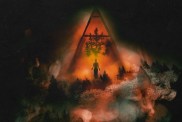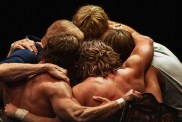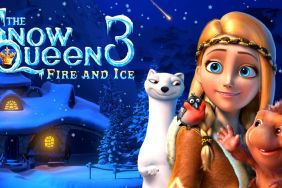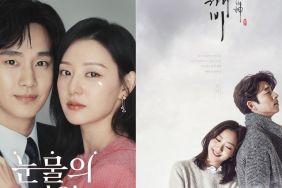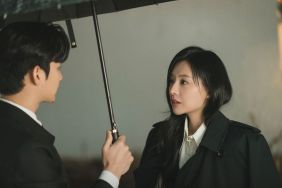Helen Mirren as HM Queen Elizabeth II
Michael Sheen as Tony Blair
Helen McCrory as Cherie Blair
James Cromwell as Prince Philip
Roger Allam as Robin Janvrin
Mark Bazeley as Alastair Campbell
Alex Jennings as Prince Charles
Sylvia Syms as HM The Queen Mother
Directed by Stephen Frears
Summary:
The perfect combination of historical extrapolation and subversive political commentary, “The Queen” sheds a new light on the British monarchy and the government. Helen Mirren and the rest of Stephen Frears’ fabulous cast make you feel as if you’re watching real events transpire.
Story:
After the death of Diana, the Princess of Wales in 1997, Queen Elizabeth II (Helen Mirren) and the Royal Family retreat to Balmoral Castle in Scotland while the country mourns and wonder why they haven’t appeared to make a public statement. For the country’s new Prime Minister, Tony Blair (Michael Sheen), it’s his chance to win the country over, while treading the delicate tightrope of trying to offer advice to the Queen on how she and her family can reconnect with the people of England.
Analysis:
One might think that a movie about the Royal Family and its relationship with the people of England and their newly elected Prime Minister might not be of interest to anyone outside of the country. Those unfamiliar with this tentative relationship might need to be brought up to speed, which is why it’s great that director Stephen Frears (“Dirty Pretty Things”), working from a brilliant script by Peter Morgan, has found a way to take you behind closed doors for an instant lesson in British government and its relationship to the monarchy.
The story begins with Tony Blair being elected by a landslide as England looks for a change from nearly two decades of Torey rule. During Blair’s first awkward meeting with the Queen, we’re given the first glimpse of the pomp and protocol that surrounds the Queen and her control over elected officials, and really, that’s all you need to know to understand the complex relationship at the heart of the movie.
The death of Prince Charles’ former wife Diana, recreated in a tasteful and sensitive manner, sets the stage for a change in the status quo, as the Royal Family must come to grips with their negative feelings towards Diana after the couple’s high profile divorce. While the country goes into deep mourning, the Royal Family retreat to their Scottish estate, refusing to make a statement, since they see Diana’s death as one that doesn’t affect them once Diana stopped being part of their family. Yet thousands of mourners stand vigil outside Buckingham Palace, blocking the gates with flowers and memorial cards, waiting for the Queen to return to London and forcing Blair to step in when people start calling for the Queen’s retirement.
The main furor behind the very concept of this movie probably comes from the way that the beloved Royal Family are depicted as callous and unfeeling about anything besides their own lives. The Queen’s husband Prince Phillip, played by James Cromwell, comes across as particularly unsympathetic in the way he states things few others will say aloud; the Queen Mum seems just clueless and out of touch. On the other side of the equation are Blair’s press secretary Alastair Campbell and his wife, who act as the “voice of the people,” often expressing their own contempt for the Royal Family’s pretentious and boorish behavior.
Regardless of your opinions on the matter, this is a great follow-up to “Mrs. Henderson Presents” for Stephen Frears, his experience in making visually stimulating films coming to the fore, even during the predominant dialogue scenes, as he cuts back and forth between the two main characters and their views on the events, the television news almost always being on in the background. The mix of actual news footage and interviews with recreations using the cast further thins the veneer between fact and fiction, to the point where you forget you’re watching actors playing roles, especially when they appear in television coverage.
A lot of this mix of reality and fiction working has to be credited to Peter Morgan’s sharply-written screenplayhis second great script of the year after “The Last King of Scotland”both of them fictionalizing accounts of real people and events. Morgan does a brilliant job surmising the conversations that must have been going on behind the closed doors of Balmoral and No. 10 Downing Street, but it also includes a brilliant bit of fiction involving a stag on the grounds of the castle that receives more concern and attention from the Queen than Diana’s death.
Despite the sad events, the movie is surprisingly witty as the various characters take pot shots at each other, much like people do in real life, but also giving the viewer a chance to find humor in the most mundane of circumstances. When Philip comes to bed and calls the Queen “cabbage”his pet name for herand asks her to move over, you can’t help but smile at the very thought of Royals acting like ordinary humans. It’s the key to why “The Queen” ultimately works so well, because as much as some might feel that the movie condemns or satirizes the Royal Family for their lack of action as the nation mourned, it does an amazing job humanizing them due to the fantastic cast Frears has assembled.
Helen Mirren’s performance as the Queen is a clear standout, as she suppresses and restrains her emotions to perfectly capture the queen’s stoic and proper nature, carried over even into moments when no one else is around. At one point, the Queen is driving her Land Rover into the countryjust thinking those words is worth a chuckleand when it breaks down, so does she, finally allowing the emotions of her situation to wash over her.
Michael Sheen’s experience portraying Tony Blair in “The Deal,” a previous Frears/Morgan collaboration, really helps, because he fully embodies the role of a Prime Minister during his first year, while taking on the self-proclaimed “institution”as the Queen calls itfor the greater good of the country. Really, the entire cast is solid across the board from Alex Jennings as Prince Charles, who has a touching and tastefully handled moment when he views Diana’s body in France, to smaller roles like the Royal Family’s personal secretary Robin Janvrin (Roger Allam), all of which add something to the mix.
After an hour and a half of watching the Queen fight the pressure to make a public statement, she and her family finally return to London and greet the people face-to-face, something that hasn’t happened since the end of WWII, and we get the sigh of relief that the movie has been building up to. Even Blair’s view of the family is changed as he finds himself defending them against the naysayers in his entourage. A few months later, all of the tension has passed, as the epilogue clearly hints at the irony that years later, Blair himself will become just as unpopular among the British people for his part in the Iraq War.
The Bottom Line:
It’s almost impossible to be outraged by this subversive look at the presumed behind the scenes happenings during a sorrowful week in British history, but the combination of real-life drama and humorous banter, solid writing with stunning performances, makes this one of the strongest and most impactive films this year.
The Queen opens in New York on September 30 after its opening night screening at the 44th New York Film Festival.

